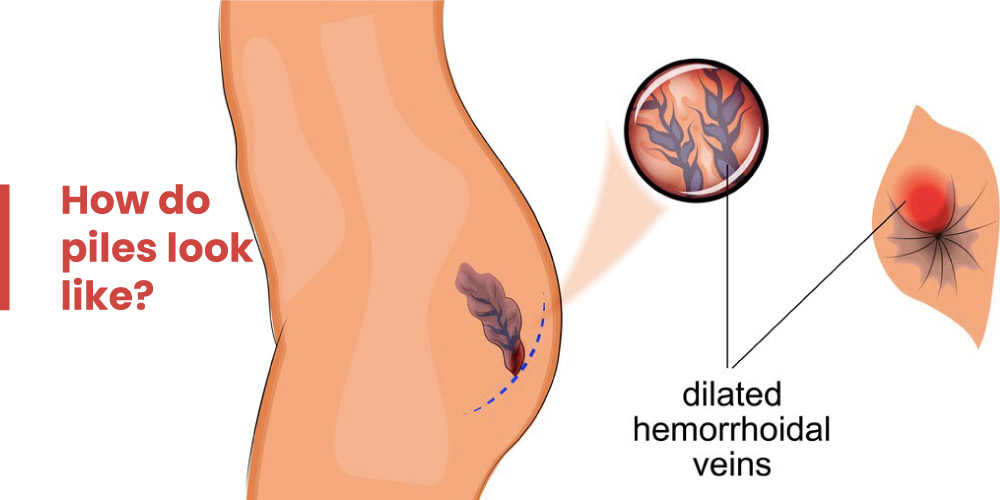Ans: Hemorrhoids or piles are blood vessels within the walls of rectum and anal canal. Hemorrhoids occurs when these blood vessels swell and tissue above them gets stretched. As a result this creates a sac like structure which comes out of anus during bowel movement.
Ans: if a person having anyone of the below mentioned symptoms then he maybe suffering from piles.
-Blood while passing stools.
-Itching.
-Painful hard lump in rectum.
-Swelling in anal region.
Ans: Piles are caused due to increased pressure in the lower part of rectum that result in stretching of blood vessels around anus and due to that inflammation of these blood vessels and surrounding tissues form piles. Main causes are:-
-Chronic constipation
-Chronic diarrhea
-Straining due to lifting of heavy weights.
Pregnancy- increased size of uterus applies pressure on lower part of abdominal cavity.
Obesity.
Fast foods with low fiber contents
Sedentary lifestyle.
Straining while passing stool.
Secondary to portal hypertension.
Ans: External hemorrhoids is easy to detect simply by looking. The diagnosis of internal piles may include history taking and clinical rectal examination by your doctor.
Ans: Everyone has hemorrhoids located near your anus, they are several internal and external blood vessels that supply the entire area. It’s only when these blood vessels start to swell problem start. Here are some tips to prevent those vessels from swelling.
• Go to the bathroom when you need to go: one should go to use bathroom when he has desire, don’t delay. Delaying may cause your stool become dry and hard, whick makes harder to pass. If you strain to pass stool, your risk for developing hemorrhoids increases. One should also not force a bowel movement when you don’t need to go. Straining increases the pressure on your venous cushions, which leads to hemorrhoids.
• Don’t turn the bathroom into reading room: the more time you spend on the toilet, the more likely you will strain bowel movements and also seated position put extra stress on your anal blood vessels. Both these factors boost your risk of hemorrhoids. So no phone intop the toilet area- no browsing facebook, instagram, twitter, playing games and also no newspaper, magazines or books.
• Reassess your diet: to prevent hemorrhoids, you want stool that is soft and easy to pass. You can reach the right consistency by making smart diet choices and drinking plenty of water to avoid dehydration. A lack of fiber in your diet is the most common culprit. So try getting more fibres from green vegetables, fruits and 100% whole grains. Fibres can help you avoid constipation. Avoid refined and processed foods. Also avoid red meat.
• Keep your body moving through exercise: moderate exercise helps improve or prevent many bowel and digestive issues, including hemorrhoids. But a note of caution if you have haemorrhoids avoid heavy weight lifting squats and similar motions that increase abdominal pressure, this cause harm if you are trying to prevent haemorrhoids.
• Other lifestyle tips to prevent haemorrhoids
- Drink more water, fibre without water makes stool hard.
- Avoid long period of sitting.
- If your are obese try to loose weight.
- Use western toilet and elevate your feet on low stool when you go to toilet and try to pass stool without extra straining.
If your symptoms change or bleeding increases, see your doctor and get your symptoms evaluated. Not all haemorrhoid treatment options are surgical. You may need an assessment to rule out other disease.
Ans: Since the home remedies fail to deliver positive results, it becomes necessary to consult the specialist doctor.
There are several types of hemorrhoids treatment available in allopathy Medications.
-Laser piles treatment
-Staple hemorrhoidectomy
-Open hemorrhoidectomy
-Rubber band ligation
-Sclerotherapy(injection therapy)
-Cryotherapy.
All the above mentioned procedure having there own limitations and benefits. We at arogyam piles clinic and research center offer parasurgical procedure for piles treatment.
Grade 1 and grade 2 piles are managed with ayurvedic medications or non invasive procedure ksharkarma is performed. In this procedure there is no incision, no bleeding, no need of anaesthesia , no need for hospitalization and anybody can undergo this procedure either he is not fit for major piles surgery.
For grade 3 and 4 ksharsutra ligation done I.e. also a time tested and cost effective parasurgical procedure for piles.
In this procedure there is also no need of hospitalization.
